- Home
- Ian McDonald
Ares Express dru-2
Ares Express dru-2 Read online
Ares Express
( Desolation Road Universe - 2 )
Ian Mcdonald
A Mars of the imagination, like no other, in a colorful, witty SF novel; Taking place in the kaleidoscopic future of Ian McDonald’s Desolation Road, Ares Express is set on a terraformed Mars where fusion-powered locomotives run along the network of rails that is the planet’s circulatory system and artificial intelligences reconfigure reality billions of times each second. One young woman, Sweetness Octave Glorious-Honeybun Asiim 12th, becomes the person upon whom the future — or futures — of Mars depends. Big, picaresque, funny; taking the Mars of Ray Bradbury and the more recent, terraformed Marses of authors such as Kim Stanley Robinson and Greg Bear, Ares Express is a wild and woolly magic-realist SF novel, featuring lots of bizarre philosophies, strange, mind-stretching ideas and trains as big as city blocks.
Ian McDonald
ARES EXPRESS
1
Here comes Sweetness Octave Glorious Honey-Bun Asiim Engineer 12th. She is eight, and this is the manner of her coming.
First, you see the sand. It is red and of a particular grain type produced only by wind action. It smells electric; there is much iron in it. It draws lightning out of the occasional clouds; once or twice in a long year, rain. Where the lightning strikes, veins of slag-iron strike deep into the sand. This is rust-sand, strewn profligately about this contourless landscape. Red sand, rust-sand, red dust, a desert of iron studded with ugly stones. The wind never ceases out here on the plains of the high high north. It has teased the sand into steep-sided ridges, long meandering sifs, crescent moon barchans. This is a sinuous, sensual landscape, curves and seductions from the slip-sliding dunefaces to the curve of the close horizon.
A solitary hard erection confronts the soft northern desert of iron. Five metres high, a slim steel shaft, scabbed by the excoriating winds, scarred by summer lightning. It is a natural victim for summer lightning. On top of the shaft, three lights, red topmost, amber in the middle, on the bottom, green. Signal lights. In the middle of a rust-desert.
Now you see the rail. Two perfectly parallel lines of Bethlehem Ares steel, rolled in the mills of New Merionedd, married together by pour-stone sleepers, tied down by figure-of-eight tie-bolts: pinned, plated and bolted. Straight and absolute as a geometrical proposition. Get down. Hunker down—not too low, under this sun your cheek will stick to the hot rail and rip. Just enough to sight along them, gun-barrels aimed at the place where horizon and heat-dazzle meet and melt. Straight and absolute. You can go over the edge of the world and they’ll run straight and absolute for seven hundred kilometres. In the cabs of the big transcontinentals there are red buttons that the engineers must touch every twenty seconds or the brakes will automatically apply. It’s easy to fall asleep over the speed levers out here. It’s a hypnotic land. It draws your soul out through your staring eyes along the twin steel rails, to whatever dwells in the silver shimmer at the edge of the world. Occasional track-side tangles of sand-polished metal prove the dangers that lie in the long straight track.
But we drive ahead of ourselves here. We must stay a while at the signal light, and ask questions. Why signal what? What is there in this dust and rust of any significance? Two things. The first is the passing loop. This patch of desert is the only place within two hundred kilometres where trains may pass and gain access to the single mainline. Here crews exchange ancient brass tokens—part key, part shield—to unlock the line. Conversations too, news and gossip, sometimes family members, or body fluids, if they are the big slow ore-haulers whose timetables allow a little society. The second thing is that, if you look up the line, you will see it part company with itself. This is Borealis Junction: one line drives forcefully on into the snow country of the north pole, where the cold can glue an Engineer’s hand to the throttles as this heat will seal flesh to steel. Up and over the top of the world, and down into the old lands of Deuteronomy and Dioscu: green places replete with grazers and herd-beasts, where every village roof-tree is high and holy with prayer kites. The other line drifts to port until it curves out of sight among the thunderous chasms of Fosse mountains, spanned by treacherous trestle bridges and pour-stone viaducts, that disgorge nerve-wracked Engineers out on to the bleak mesa-lands of Isidy. For half a quartersphere the lines are drawn together by mutual magnetism until they meet once again at Schiaparelli Junction to run westward along the vast synclinorium of Great Oxus and the thousand towns of Grand Valley, where the Worldroof sparkles on the horizon like a reef of morning-lit cloud.
So this signal light is more than an arbitrary stop-go in the wilderness. It is the prefect of line safety, it is guardian of the line tokens, it is the gateway to new landscapes. And, no less than any of these, it is Sweetness Octave Glorious Honey-Bun Asiim Engineer 12th’s Uncle.
It is time she made her entrance.
You become aware that the rail burning the sole of your desert boot is trembling. Bend down—don’t touch! Yes. Rail humming. Train coming. You squint under the shade of your hand down the long straight line. What is real and what is potential is still undecided in that haze. But the rails are singing now: a deep, tight, harmonious keening. A sharp dry clack. You have to look around at the nothingness several times before you can see the small but significant change. The points have switched on to the passing loop.
Peer again: shapes moving in the haze, flowing so you cannot be certain it is one thing or many. Silver in silver. Then the shadows flow, silver out of silver: a winged woman, wing-arms folded back, breasts out-thrust, hair streaming in the wind. In your amazement you almost do not notice that the track is roaring. Red dust bounces up from between the sleepers. Now you realise your mistake. This is no angel. Its shadow flows out behind it into a shield of darkness: you are looking at the boiler-cap and figurehead of a great train. A very great train indeed: the faceless land has been playing tricks with your perspective. You had thought the winged woman pixie sized, maybe a medium-grade Amshastria, but close and manageable. No. This silver angel-woman is enormous, the curved prow of the boiler gargantuan. The train is kilometres away. But it is very very big. Airship big. City-block big. Ocean-liner big, if this world had oceans fit for liners. The buffer plates, held out like a prize-fighter’s weaving fists, are three metres across. The cow-catcher, baroquely ornamented with figures from the Ekaterina Angelography, could sweep entire phyla from its path. The eight bogies are each the height of a decent house: the spokes of the drive wheels are the crucified arms of windmills. The drive shafts, the thickness of a thick man’s body, pump with the regular, tireless ease of a Belladonna sweat-house laddie. The headlamp is a monstrous cyclops eye, furious with heat, all revealing. It is hooded now, but with the magic hour, it sends its sheer white shaft kilometres ahead of it, a vanguard of the divine. The steam that blasts from the sharply raked stack is so hot that it travels a third the length of the fusion boiler before it condenses into visibility. This train leaves a pure white contrail downtrack for ten kilometres.
Another glance at that smoke-stack. Down at the base, where it flares into the main caisson, is that a handrail? Are those staircases, is that a balcony? Those gleams of highlight, could they be windows? There, just above the halo of the Bethlehem Ares Railroads angel, is that an arc of glass, like the bridge of a ship? And balancing precariously on the swept-back piston housings, spilling steps and ladders over the buffer cylinders, what else can those be but low buildings? A swathe of bungalows clings to the skirts of Bethlehem Ares Railroads Class 22 Heavy Fusion Hauler Catherine of Tharsis. And there, on that perilous railed-in viewpoint underneath the smoke-stack, is that a figure?
Nearer now. Yes, a sun-brown lank of a female dressed in the uniform orange track vest of her clan over a flirty flora
l-print frock. A tousle of black curls tosses around her face, combed back from great cheekbones by the speed of passage.
And now you notice how close the train is to you. Too much time spent staring at the girl on the high balcony. It’s on top of you. You should—you must—run. But you cannot. The whole world is quaking to the pound of the engines, and you are transfixed in its track like a hopper in headlights. A steel avalanche rears over you. Crushing death pants in your face. The black and silver angel looms over you like judgement, and turns away. Catherine of Tharsis swings on to the passing loop, tucking her three kilometre tail neatly behind her. Brakes shriek, steel and grit bite and grind. It takes a lot of space for the big transpolars to stop. This is by no means the largest. There are tripleheaders hauling ten kilometres out of Iron Mountain. The magic thousand trucks. Those mothers are visible from orbit, like steel rivers.
The caboose clears the points. It’s a frantic congeries of railroad utility and Cathrinist whimsy. No Step Here, with hand-painted round-eyed icons of the Seven Sanctas. Grit boxes and prayer flags, now windless and limp. The Bassareeni are a gaudy people. Socially below the salt, but the Engineers have always got on well with them, outside the Forma. There was a mingling of genes some generations back. The Stuards have never forgiven, never forgotten, but the Stuards are a notoriously anal Domiety.
A trickle, a creep, a hiss of steam. Thirty-three thousand tons of Bethlehem Ares steel balances on two ten-centimetre ribbons of metal under the hot, high sun.
Clunk. The points have switched over again, back to the mainline. The signal light has gone from caution to green. New train coming. But that is not part of your story. Your story is ended here. Your part as observer of these events is complete. Your eyes have shown us what only the desert things and God the Panarchic see, at this forsaken junction in the high polar desert. You are dissolved back into a greater story that begins here, the story of Sweetness Octave Glorious Honey-Bun Asiim Engineer 12th.
2
Naon Sextus Solstice-Rising Engineer 11th always experienced a little death when he took his hands off the drive lever. Post coital. He coyly shrugged the thought away—exaggeration—but that first time when his own father Bedzo 10th had taken his hand and laid it on the drive bar, when he lifted it off again, had there not been a tiny damp spot on the fly of his pants?
Twenty years rodding and railing had made him acute to every whisper and vibration of his machine. The fusion fires ebbing in the magnetic pinchtorus was a languid decay, a sorrowful limpening. Flaccid. He was never truly himself while the fusion engines slumbered. He grew distracted and irritable. All his family had learned this decades ago and were wise.
He called up a track report from North West Regional Track at Suvebray. The mottled quartersphere resolved in the projector focus, the mainlines a web of throbbing vessels like the arteries of a womb. The fast Northern Lights Express was still twenty minutes down despite its Engineers rattling every valve up into the ochre on the long Axidy incline. Derailment at Perdition Junction, down to a single track. Damn locals, jammed with commuters and roof-riding goondahs, stopping at every hole in the hedge. Woolamagong! Serendip! Acacia Heights! Atomic Avenue! Naon Sextus was not a man who bore delays with grace. Every lost second felt pared from the exposed end of his life, like hard salt cheese. As a child he had read and memorised timetables. For fun. He snatched the monocular from its peg, peered impatiently down the branchline but even the vantage of the bridge of Catherine of Tharsis could not penetrate the haze.
“Tcha!”
Casting around for an object on which to flog his annoyance, he noticed through the grille of the catwalk overhead a pair of yellow desert-boot soles. He turned his lenses on them.
“Mother of plenty, has that child no shame?”
A woman’s voice answered from behind him: Child’a’grace, Mrs. Asiim Engineer 11th, floury to the elbows, folding samosas in the domestic galley.
“What, dearest?”
Firmness was as much a part of Naon Sextus’s character as good timekeeping. Many a time the unexpected voice of his wife had almost tricked him into speaking but he had never lapsed, not once, in four years. He tightened his lips, gave the nasty cough that was the sign for his wife to look at him. Naon Sextus turned from the control board, enough to glimpse Child’a’grace, but not so much that she might think he was looking at her.
No underwear! his fingers said, shaking with indignation.
“It’s a fine day,” Child’a’grace commented, deftly sealing a pastry triangle and flipping it into hot fat.
The shame! Naon Engineer signed.
“Who’s to see?”
Every staring soul on the thirteen twenty-seven Northern Lights Express! For something was emerging from the liquid light dazzle. Due in three and a half minutes! As a coda, his thumbs added, What will they think?
“They will think,” said Child’a’grace breezily, here fishing samosa from the fry-bath with a chicken-wire scoop, “That there is a fine young woman of nearly-nine with the body of an Avata and the impatience of a rat whom you and I both know, husband, should long since have been married.” She drained the golden oil back into the pan. “And if by some chance, the passing winds should blow that skirt up—which they might, for if I remember, it is quite short and floaty—and they see that she wears not underpants, then the more fortune to them and I hope their sleeps are tormented by wants for many a night.”
Before leaving her family at an unnamed water stop under the volcanoes, Child’a’grace had been Susquavanna, a catering people who for two long centuries had hawked hot savouries up and down the platforms of the northwest quartersphere. Pastry was in their genes, like steam in the blood of the Engineers, but she resolutely refused to observe the proprieties of caste, namely the eternal distinction between track and platform. This was deeply grievous to Naon Sextus, a son of his father and his line before him. Truly, the dowry had cleared up the matter of the remortgage, but he frequently wished that Grandmother Taal had matched him with someone a little less platform. But after eleven years, the food was still exciting. The sex can go, the conversation will go, the respect may be trodden into a familiar track of predictability, but by the Mother of Mercies, cooking endures.
But the girl had no underwear, and one under-dignified marriage was enough. Women with no knickers ended married to Bassareenis and dropping their sprogs in the caboose. His fingers prepared to riposte this to Child’a’grace but the shapes were blown away by the sudden slam of the express train’s passing.
3
There was a moment that Sweetness Asiim Engineer treasured above all other distinct moments. She had travelled long enough around the globe to admit it as almost sexual, but it was entirely her own. It began with a brief flutter, an intake of breath, a stirring of hair and clothes: the pressure shift. At this point you obtained best effect by closing the eyes and listening to the swelling thunder of wheels. Hold the dread: fight the instinct to look at the source of that unholy noise. Then, the second pressure point: there. Sweetness opened her eyes. The fast train reared like a cliff before her. The world was nothing but steel and steam and blasting, shattering sound. Sweetness unleashed the deep, dark fear: You’re on the wrong track, the points have failed, sixty thousand tons of train are about to meet head on at three hundred and fifty kilometres per hour, and you’re right between them!
It would be quick, and glorious.
The mountain aimed itself at her heart and, at the last instant, turned away.
The pressure wave punched her hard, blinded her with steam and dust. Then the slipstream yanked at her: You, come. Sweetness needed no invitation. She leaped after the blur of chrome and black. Along clattering catwalks. Down iron staircases. Across vertiginous gantries, over platforms, hurdling the sprawling legs of brother Sleevel, lolling idle with his best mate Rother’am watching the afternoon pelota on a handheld.
“Sle.”
“What? Uh. Just my sister.”
Sweetness rac
ed the faces behind the tinted window glass but the faces were always going to win. The wind that dragged her was failing. It dropped her in a little iron-framed oriole high on the side of the starboard tender coupling. She leaned out over the brass railing, raised her hand in salute to the glass observation car, the rattle in the express’s tail. On the open rear balcony was a fine city lady in a sheer lace dress. Wake turbulence tugged her parasol from her fingers. It soared up and away, a bamboo and waxed-paper flying saucer. The city lady looked up, vexed, and in that moment her eyes met those of the black-haired girl in the orange track vest in the wrought-iron carbuncle on the flank of the big hauler.
Lady and train were a thin black snake winding across the red desert. Carried high on the winds, the parasol floated into invisibility. The haze swallowed all. Gone again.
“You’re a fool to yourself,” the voice said after a decent interlude. The thunder of wheels had masked his approach, but Sweetness had deduced Romereaux’s presence from his smell. All the Deep-Fusion people had a distinctive musk, like electricity and cool evenings after hot days, or concrete after rain. Sweetness imagined it was what atoms smelled like.
“You think.”
He was leaning against the turret door in the easy-pleasey way men can when it’s not important for them to be looked at. Romereaux’s people shared hair colour and quality with the Engineers—and body fluids, certain generations ago—but he was slight and pale, with a narrow shadow of attempted goatee. The sun did not get to the Deep-Effs in the heart of the big train.
“Two hundred years of Engineer tradition says I know what I’m talking about.”
He was a year and a half Sweetness’s senior and, bad genes or not, next corroboree he would marry a Traction daughter off the Class 88 Four Ways. She would miss him.

 Empire Dreams
Empire Dreams The Menace from Farside
The Menace from Farside Luna: Moon Rising
Luna: Moon Rising Moon Rising
Moon Rising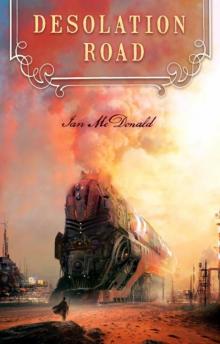 Desolation Road dru-1
Desolation Road dru-1 Empress of the Sun
Empress of the Sun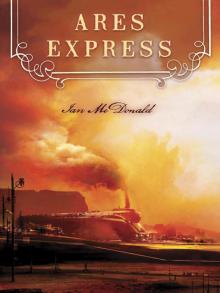 Ares Express dru-2
Ares Express dru-2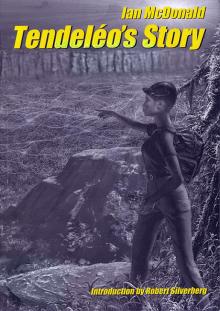 Tendeléo’s Story
Tendeléo’s Story River Of Gods
River Of Gods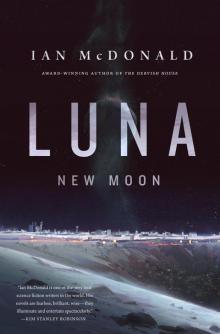 Luna
Luna![Cyberabad Days - [River of Gods 02] Read online](http://i1.bookreadfree.com/i1/03/29/cyberabad_days_-_river_of_gods_02_preview.jpg) Cyberabad Days - [River of Gods 02]
Cyberabad Days - [River of Gods 02]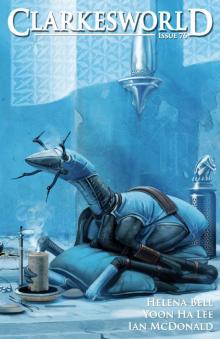 Clarkesworld Magazine Issue 76
Clarkesworld Magazine Issue 76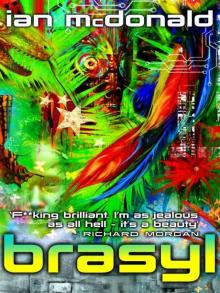 Brasyl (GollanczF.)
Brasyl (GollanczF.) Scissors Cut Paper Wrap Stone
Scissors Cut Paper Wrap Stone Chaga
Chaga Time Was
Time Was Cyberabad Days
Cyberabad Days Be My Enemy
Be My Enemy Changa
Changa King of Morning, Queen of Day
King of Morning, Queen of Day Out on Blue Six
Out on Blue Six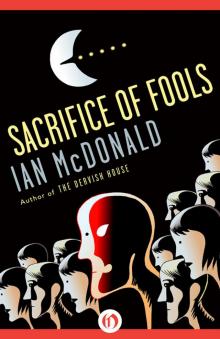 Sacrifice of Fools
Sacrifice of Fools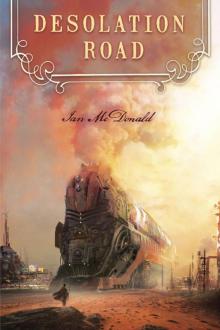 Desolation Road
Desolation Road Luna--Wolf Moon--A Novel
Luna--Wolf Moon--A Novel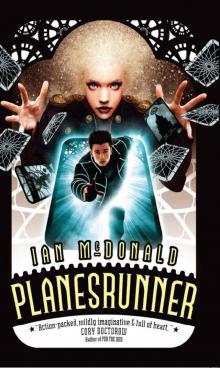 Planesrunner (Everness Book One)
Planesrunner (Everness Book One)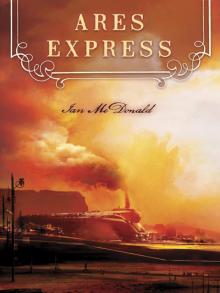 Ares Express
Ares Express